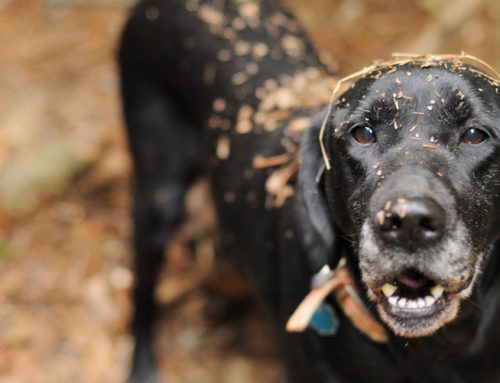That vibration under your chair might not be an earthquake. It might be your dog, hiding and shaking. Environmental and health stressors can cause your dog to tremble uncontrollably. Excitement, illness and even the temperature of your home may cause your dog to shake. Some of the reasons for shaking are easier to address than others.
Dogs shake from stress
Dog anxiety is real and frustrating for pet owners, and probably the dogs too. Shaking can be a sign of ongoing anxiety, but it won’t be the only symptom. Anxious dogs bark, pace, pant, lick, lunge unexpectedly and sometimes are destructive. Chances are, if you have an anxious dog, shaking is part of the package. Sometimes, a dog’s anxiety can spike, which leads to shaking.
Frightening or exciting events can cause shaking
Dogs have different fears. Some dogs are afraid of the sound of thunder, gunshots, fireworks or the rumble of a garbage truck as it goes down the block or back alley. Some dogs shake uncontrollably when the fire alarm goes off or if they have to go in the car, or visit the vet hospital.
Some dogs will shake with joy when you return from the grocery store, or after a prolonged trip. If your dog is shaking because it’s happy to see you, there’s no urgent reason to be concerned.
Shaking caused by frightening or exciting events is the easiest to manage. It should stop as soon as the environmental stressors are gone and your dog has had a few minutes of peace and quiet.
Expedite the process by making sure your dog has a cozy place to sit, and offer comfort with a favorite toy or some gentle affection.
Some dogs have Generalized Tremor Syndrome (GTS)
Some dogs, like Chihuahuas or Miniature Pinschers anecdotally shake a lot. GTS is more common with small dogs.
GTS is sometimes known as ‘Little White Shaker Syndrome’ because it is common in small white dogs like Maltese or the West Highland White Terrier. The cause of shaker syndrome and GTS isn’t known. The article ‘Shaker Syndrome in Dogs’ provided by VCA Hospitals, notes that “Shaker syndrome is a ‘diagnosis of exclusion.’
Basically, if there are no other identifiable causes, your dog may be diagnosed with the syndrome. It is treated with a steroid that suppresses the dog’s immune system.
Discuss GTS with your vet if you have a small dog with the shakes. It usually manifests in dogs aged one to six years old.
Your dog needs a sweater
The shakes may mean your dog is freezing. Some breeds are prone to being chilly either because they are warm weather dogs or because they have short coats, or low body fat. Some dogs, like Huskies and German Shepherds, have an extra fur undercoat. But dogs without an undercoat don’t stay as cozy in cold temperatures as those lucky breeds.
You’ve probably seen Chihuahuas or Whippets wearing sweaters or jackets in the fall. Chihuahuas are native to hot, dry Mexico. The Basenji also prefer warm weather as they are originally from Central Africa.
Whippets are lean, thin, and have short coats. Same goes for Greyhounds. Pit Bull Terriers are stocky, but their short coats make them prone to feeling chilly. Dachshunds are low to the ground so their tummies feel a draft.
Dogs with short noses, like Boston Terriers or Pugs can have a hard time breathing in the cold. That, with their short coats and small sizes, make them likely candidates for shivering from the temperature. Surprisingly, Great Danes and Boxers also get cold, despite their size and musculature. Vizsla and German Shorthaired Pointers also are high energy, low fat dogs and may require an extra layer. Doberman Pinschers, Basset Hounds and the Chinese Crested are also good candidates for a coat.
Yorkies have long hair, but no undercoat, so a Yorkie may need a sweater.
If it’s cool in your area, or your home, and your dog is constantly seeking out a warm spot to sit, try an adorable commercially produced sweater. Or knit them one. What’s cuter than a dog in a handknit sweater?
Any type of dog can be sensitive to cold weather, so even if yours has a thick coat and is otherwise healthy, it can still feel the elements. If you’re outside wearing a coat and you feel chilly, there is a good chance your dog does too. Aside from a dog’s full body exposure to the elements, its paws come into direct contact with the cold ground. While some dogs might happily wear booties for added warmth, others may do their best to kick them off.
Your dog may be feeling ill
There are several illnesses that may cause shaking.
Distemper: This is a viral illness that dogs are vaccinated for. However, if you have a puppy or a young dog still going through the vaccination process, the shaking could be distemper related. Other symptoms include runny eyes and nose, fever, or coughing.
Nausea: Dogs can get motion sick, just like humans. They can also feel nauseated if they ate something they’re allergic to, or if they munched something toxic. Other symptoms of nausea include lethargy, lip smacking, excessive swallowing or salivating, yawning and vomiting.
Poisoning: Poisons and toxins can lead to shaking. If you caught your dog eating chocolate, cigarettes, xylitol, toxic fruit (grapes) or veggies, you should call your vet for next steps.
Fever: A temperature spike can cause dogs to tremble, especially if the dog is fighting an infection.
Other illnesses: Shaking can be a symptom of a serious illness like Addison’s disease, kidney disease, or seizure or neurological disorders. However, shaking won’t be the only symptom — serious illnesses have many associated symptoms.
Your dog may be getting older
As dogs age, they can develop tremors in their hind legs. Trembling can also be a strong indication your dog is in pain. Older dogs may have sore joints from arthritis or be suffering from an undiagnosed chronic illness and the pain is causing them to shake.
When should you have a vet assess your dog’s shaking?
If you’ve ruled out non-health related causes (being cold, scary sounds), and your dog has been shaking for a prolonged period, it’s time for a visit to the vet.
If shaking came on suddenly for seemingly no reason, and you think your dog may have eaten something toxic, a trip to the vet might be urgent. This is especially true if your dog has other symptoms like diarrhea, vomiting or limping.
Senior dogs with shaking may be in pain, and a vet assessment is a good place to start.





